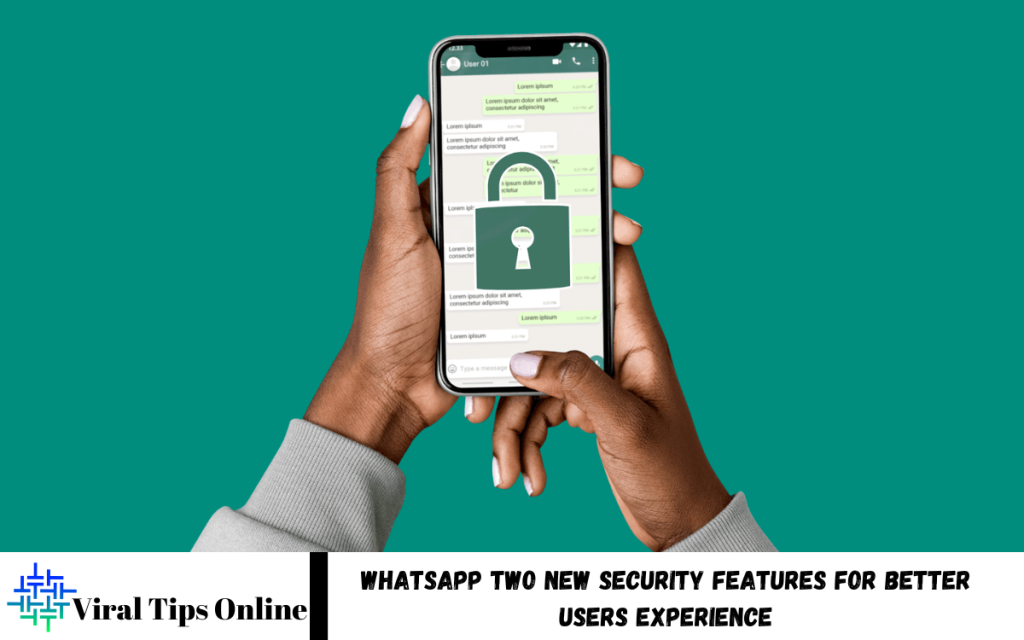WhatsApp Two New Security Features for Better User Experience: WhatsApp, the globally popular messaging platform, has introduced two innovative security features designed to enhance user privacy and safety. With over two billion users worldwide, WhatsApp continues to prioritize secure communication by rolling out updates that address evolving security challenges.
The first feature is Chat Lock, a powerful tool for protecting sensitive conversations. This feature allows individuals to secure specific chats with a password, PIN, or biometric authentication, ensuring that private discussions remain confidential even if someone else accesses the device. Locked chats are stored in a separate section, adding an extra layer of discretion for sensitive information.
The second feature is Account Protection, which safeguards user accounts from unauthorized access. If a user attempts to switch their account to a new device, this feature requires verification through the existing device. This two-step confirmation process significantly reduces the risk of unauthorized account transfers, offering users peace of mind.
Why Security Matters in Messaging Apps?
Messaging apps have become an integral part of our daily lives, enabling instant communication with friends, family, and colleagues. However, the convenience of these apps comes with the responsibility to safeguard sensitive information. Here’s why security in messaging apps is crucial:
- Protection of Personal Data
- Users often share private information, including photos, documents, and financial details, through messaging apps. Without robust security measures, this data is vulnerable to interception or misuse.
- Preventing Unauthorized Access
- Cybercriminals frequently target messaging apps to access accounts and steal sensitive information. Strong security features can help prevent unauthorized access and account takeovers.
- Safeguarding Conversations
- Conversations often include confidential discussions, whether personal or professional. Security features like end-to-end encryption ensure that only the intended recipients can view the messages.
- Combatting Cyber Threats
- Phishing attacks, malware, and spyware are common threats in the digital landscape. Secure messaging apps can detect and mitigate these risks, providing a safer user experience.
- Maintaining Trust and Privacy
- In a world where data breaches are frequent, users expect messaging platforms to prioritize their privacy. Strong security measures build trust and ensure users feel confident in using the app.
Security in messaging apps is not just an added feature but a necessity to protect users in today’s digital age.
How Chat Lock Protects Sensitive Information
The Chat Lock feature introduced by WhatsApp is a powerful tool designed to enhance privacy and safeguard sensitive information shared in conversations. Here’s how it works to ensure your chats remain secure:
- Password or Biometric Protection
- Chat Lock allows users to secure specific conversations with a password, PIN, or biometric authentication, such as a fingerprint or facial recognition. This ensures that even if someone has access to your phone, locked chats remain private.
- Separate, Hidden Section for Locked Chats
- Once a chat is locked, it is moved to a dedicated, hidden section within WhatsApp. This makes it easier for unauthorized users to locate or access these conversations with proper authentication.
- Protects Confidential Data
- Whether it’s sensitive business information, personal conversations, or shared documents, Chat Lock prevents unauthorized access to messages that require privacy.
- Secure Notifications
- Chat Lock can also conceal notifications for locked chats. This prevents message previews from appearing on the screen, further safeguarding your privacy from prying eyes.
- Enhanced Control and Discretion
- By empowering users to lock only specific chats, WhatsApp ensures that users have complete control over which conversations require additional security, balancing privacy with usability.
Chat Lock offers a simple yet effective way to protect sensitive information, making WhatsApp a more secure platform for private communication.
Read Also: YouTube May Show Ads When You Paused Videos
The Importance of Two-Step Verification in Messaging
Two-step verification (2SV) has become a cornerstone of online security, especially in messaging apps. By adding an extra layer of protection, this feature ensures that users’ accounts are safeguarded from unauthorized access. Here’s why two-step verification is essential in messaging:
- Enhanced Account Security
- Two-step verification requires users to provide a second form of authentication in addition to their password. This makes it significantly harder for hackers to gain access to accounts, even if they obtain login credentials.
- Prevention of Account Takeovers
- Messaging apps are prime targets for cybercriminals aiming to hijack accounts. With two-step verification, even if a password is compromised, the additional verification step prevents unauthorized logins.
- Protection Against SIM Swapping
- Hackers often use SIM-swapping techniques to take over accounts linked to phone numbers. Two-step verification adds a critical barrier, ensuring that access requires more than just possession of the SIM card.
- Safeguarding Sensitive Data
- Messaging apps often contain personal and professional conversations, shared files, and sensitive information. Two-step verification ensures these assets remain protected from breaches.
- Building User Trust
- Users are more likely to trust a platform that prioritizes their security. Two-step verification demonstrates a commitment to privacy and safety, fostering confidence among users.
- Mitigating Social Engineering Risks
- Even with strong passwords, users can fall victim to social engineering attacks. The additional authentication step helps mitigate such risks, as attackers are unlikely to have access to both verification factors.
Two-step verification is no longer a luxury but a necessity in the modern digital landscape. By implementing it, messaging apps can provide a safer and more reliable communication experience.
Frequently Asked Questions
Do I need to enable Chat Lock and Account Protection manually?
Chat Lock needs to be enabled in the chat settings for individual chats. Account Protection is automatically activated when transferring accounts.
Can I recover a forgotten password for locked chats?
If you forget your password, you may need to reset it using the app’s recovery options, which may include email or other verification methods.
Is Chat Lock available for all devices?
Chat Lock is available on both Android and iOS devices, provided the app is updated to the latest version.
How does Account Protection prevent SIM-swap attacks?
By requiring verification from the existing device, Account Protection ensures that even if a SIM swap occurs, the attacker cannot transfer the account without access to the original device.
Why should I use these features?
These features provide enhanced control over your privacy and account security, ensuring that sensitive conversations and your WhatsApp account are protected from unauthorized access.
Conclusion
WhatsApp’s introduction of Chat Lock and Account Protection marks a significant step forward in enhancing user security and privacy. These features address common concerns about unauthorized access and ensure that sensitive information remains protected. Chat Lock empowers users to secure private conversations with passwords or biometric authentication, offering greater discretion and control over personal and professional chats.



